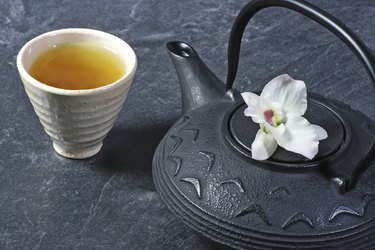
Most people reach for a cup of coffee when they need an energy boost, but tea can stand in just as well. The best energy teas are those with caffeine as well as some herbal varieties.
Tip
Green and black teas with caffeine and some herbal teas, like yerba mate, may boost your energy.
Video of the Day
Caffeinated Energy Teas
Caffeine is the world's most widely used stimulant drug, according to the National Institute on Drug Abuse. By activating the central nervous system, it increases the speed at which messages travel between the brain and the body. This is what gives people feelings of increased energy and focus.
Video of the Day
Coffee is the most popular delivery system for caffeine in the Western world, where not as many people drink tea. Additionally, tea doesn't contain as much caffeine, so you may need to drink more of it to get the same effects. That doesn't mean it's not a worthy source of the stimulant, because tea offers several other potential health benefits.
Not all teas contain caffeine. Black, green and oolong teas are the most common caffeine-containing teas. Herbal teas are naturally caffeine-free, and some caffeinated teas may be available as decaffeinated.
In terms of caffeine content, black teas have the most caffeine, with about 48 milligrams in 8 ounces, according to the Academy of Nutrition and Dietetics. Oolong comes second, with roughly 38 milligrams of caffeine in 8 ounces, and green tea has the least caffeine with 29 milligrams. Compare that to black brewed coffee, which provides 95 milligrams per cup.
Herbal Energy Teas
Caffeine is widely proven to boost energy, but it may not be the only way to get a buzz going. Herbs have been used for various purposes by humans for centuries, and some purportedly can prevent fatigue and boost energy. Here are a few of your choices:
Yerba mate: A plant native to South America, yerba mate may have psychomotor effects including increased focus, alertness and energy, and decreased fatigue, according to a research review published in Nutrients in August 2017. It may also improve mood and suppress appetite.
Ginseng: Used in Eastern traditional medicine, ginseng is an "adaptogen," an herb that may help ameliorate stress and aid a return to homeostasis, according to a review in BioMed Research International in February 2018. These effects may lead to decreased fatigue and increased cognition.
Ashwagandha: Another adaptogenic herb, ashwagandha may also be effective at reducing stress-induced fatigue to boost energy. Study results published in Integrative Cancer Therapies in July 2013 also found that supplementation with ashwagandha reduced fatigue caused by chemotherapy in 100 breast cancer patients. Additionally, ashwagandha supplementation increased muscle mass and strength in resistance-trained participants in a small study published in Journal of the International Society of Sports Nutrition in November 2015.
Rhodiola: In traditional Chinese medicine, another adaptogen called Rhodiola is believed to replenish qi (energy), stimulate blood circulation, unblock blood vessels and improve mental function, according to a review article published in Frontiers in Pharmacology in December 2018. The National Center for Complementary and Integrative Health reports that evidence shows rhodiola may increase physical and mental performance and reduce mental fatigue, but more research is necessary.
Caution should be exercised when using herbs. Although they are natural substances, there may still be a risk of negative effects, especially when consumed in excess of recommended doses. However, excessive caffeine intake also has risks.
Whatever energy tea you choose, have a cup or two to see if you get the results you're after. Otherwise, adequate sleep, a healthy diet, proper hydration and regular exercise are proven, safe ways to boost energy and keep it boosted for the long term.
- National Institute on Drug Abuse: "Adolescent Caffeine Use and Cocaine Sensitivity"
- Alcohol and Drug Foundation: "What is Caffeine?"
- Academy of Nutrition and Dietetics: "The Health Benefits of Tea"
- University of Michigan: "Caffeine"
- Nutrients: "Yerba Maté (Ilex paraguariensis) Metabolic, Satiety, and Mood State Effects at Rest and during Prolonged Exercise"
- BioMed Research International: "A Review of Ginseng Clinical Trials Registered in the WHO International Clinical Trials Registry Platform"
- Journal of the International Society of Sports Nutrition: "Examining the Effect of Withania Somnifera Supplementation on Muscle Strength and Recovery: A Randomized Controlled Trial"
- Integrative Cancer Therapies: "Effect of Withania Somnifera (Ashwagandha) on the Development of Chemotherapy-Induced Fatigue and Quality of Life in Breast Cancer Patients."
- Frontiers in Pharmacology: "Rhodiola rosea L. Improves Learning and Memory Function: Preclinical Evidence and Possible Mechanisms"
- National Center for Complementary and Integrative Health: "Rhodiola"